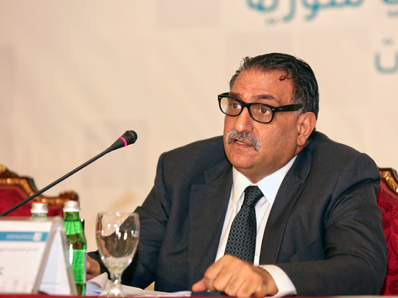 |
| Participants at the opening session of the workshop |
A one-day symposium on Russia’s escalated military intervention in Syria, hosted by the Arab Center for Research and Policy Studies (ACRPS) in Doha, concluded on Saturday, October 24, 2015.
Proceedings began with ACRPS General Director Azmi Bishara, who highlighted the futility of analyzing any international involvement in the Syrian conflict on moral grounds: the foreign sponsors of either of the two warring parties, he said, were not driven by morality but by their own interests. The only parties driven by the Syrian cause, stressed Bishara, were activists struggling in Syria. Further expanding on the dynamics driving Russia’s recent military campaign, Bishara noted how unlike the former Soviet Union military interventions, Russia will neither justify its military action with a social justice rhetoric, nor will it claim that these interventions seek to spread democracy as does the West, since above all Russia prioritizes a national security discourse. The Kremlin’s attempt to save the Assad regime is not a goal in itself, he argued, rather this latest involvement is but a preamble for negotiation on a power balance that preserves and expands Russia’s sphere of interests, a view shared by conference speaker and first chairman of the Syrian National Council Burhan Ghalioun.
In the midst of this, continued Bishara, the White House remains ineffectual. Disparaging analogies, he said, between the Obama and Carter administrations were misplaced: in 1979, Carter’s support to the Mujahideen via the Pakistani government began within weeks of the Soviet invasion of Afghanistan, at odds with Obama’s refusal to support Syrian rebels. The US position thus stands in sharp contrast with that of Russia, which has to date secured massive leverage with all parties to the Syrian conflict through unswerving active involvement.
 |
|
ACRPS General Director Azmi Bishara contrasts the Obama and Carter administrations differing approaches to foreign policy.
|
With the war in Syria rapidly turned into a battle between factions fighting for geostrategic interests, superseding ethics or values, the Syrian opposition, urged Bishara, should present a democratic alternative to autocracy that will enable it to rule Syria. Otherwise, like other civil wars worldwide, the Syrian conflict risks ending with a compromise and quota allocations. More alarming, is the prospect of the current Russian military intervention turning the Syrian conflict into a mere article included in a geostrategic compromise between superpowers.
Meanwhile, Majed Al Turki, a Saudi policy expert with a doctorate from Moscow University, suggested that in Saudi policy circles, “increasingly, there is a distinction being made between Bashar al Assad and the regime as a whole”, with Saudi politicians gradually amenable to the idea of keeping the present Syrian regime in place provided that Bashar Al Assad is excluded. This could be traced to a sense of resignation, since, in Al Turki’s words, “neither [the United States nor Russia] countenance the toppling of Bashar Al Assad”. Even more surprising than the notion of US complicity in the maintenance of the Assad regime, is the extent of understanding between Israel and the sponsors of some of its arch foes.
According to Mahmoud Muhareb, an ACRPS researcher and Israeli affairs scholar residing in Palestine, the Israeli government has secured assurances from Moscow that Russian operations in Syria would not lead to Iranian forces or pro-Assad militia threatening Israel. Participants at the meeting pointed out that this scenario presented a good opportunity for Israel to stand idly by and watch its enemies drain each other. Such intricacies highlight the way in which the conflict in Syria, even prior to Russia’s intervention, was one that cut across national, ethnic and sectarian boundaries, creating a powder keg of competing interests. It was no wonder that, as Sergei Strokan, a Russian participant at the meeting, put it, “emotions are running high”.